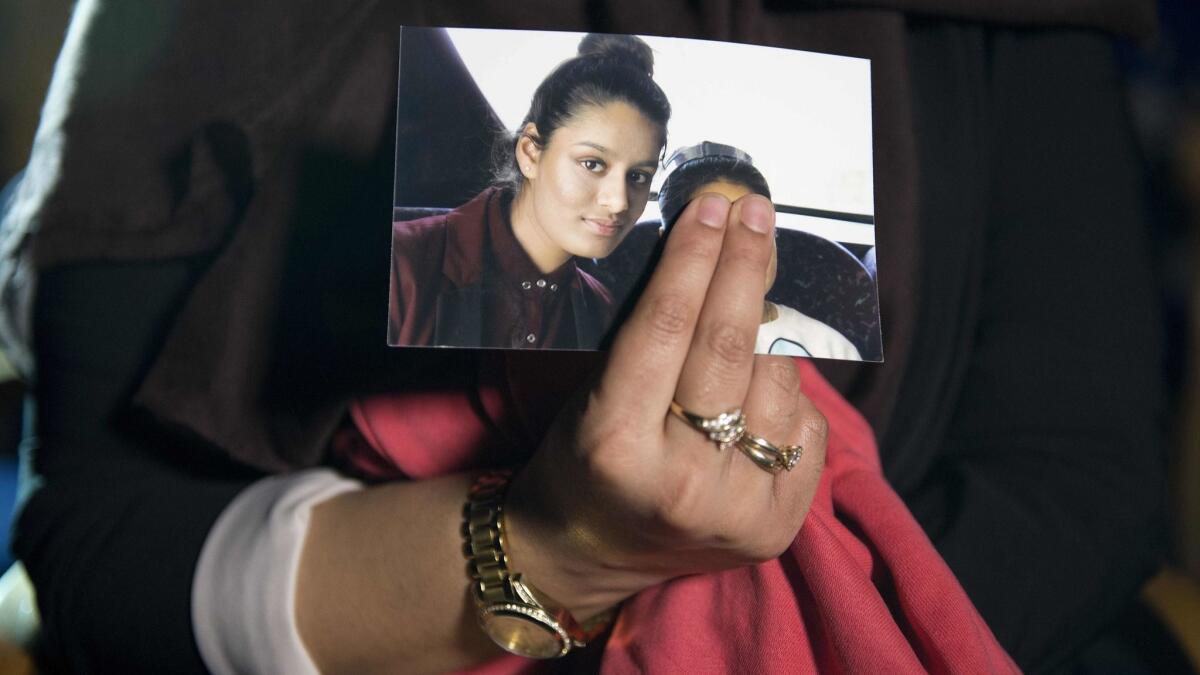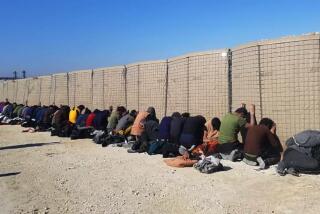A teen Islamic State bride wants to come home and have her child. Britain is in an uproar
- Share via
Reporting from LONDON — In February 2015, a grainy still photo from CCTV footage that became familiar to almost everyone in Britain showed a slightly built London schoolgirl stepping through the narrow gate of an airport security scanner.
It might as well have been the portal to another world.
With downcast eyes, heavy horn-rimmed glasses and the slightly gawky posture of the 15-year-old she was, Shamima Begum, together with two teenage girlfriends, was about to board a flight from London’s Gatwick Airport to Istanbul, Turkey, a journey that would take them into the heart of the “caliphate” of Islamic State.
Now Begum has surfaced at a squalid refugee camp in northern Syria — seemingly unrepentant, heavily pregnant with her fighter husband’s child, and voicing a desire to return to Britain.
“All I want to do is come home,” Begum told Anthony Loyd, a famed war correspondent for the Times of London, who heard a snippet of the heavily veiled young woman’s distinctive accent and asked if she were one of the “Bethnal Green girls,” so named for the East London district from which they vanished.
In her homeland, the electrifying reappearance of a young woman once mourned as the child victim of a cult-like group has triggered an enormous outcry, much of it in the form of furious condemnation.
Minus some expletives, the prevailing view on social media could largely be summed up as: “Leave her to rot.” Authorities warned that Begum could face prosecution if she managed to make her way back. But many insisted she should not be allowed to return to Britain at all.
I’m not the same silly little 15-year-old schoolgirl who ran away from Bethnal Green four years ago.
— Shamima Begum
Now 19, Begum told Loyd she had already lost two infant children to malnutrition and disease and said she had fled the group’s last stronghold, the Syrian town of Baghuz, out of fear for her unborn child.
But she struck a defiant note as well, telling the paper: “I don’t regret coming here.”
She did, however, voice disillusionment with what she called “oppression and corruption” within the caliphate. “I don’t really think they deserve victory,” she said.
Four years ago, it might have seemed that little in Britain could rival the outcry over the three schoolgirls’ disappearance into the maw of a group whose name had become a byword for brutality and enslavement.
The girls’ flight triggered nationwide hand-wringing over online radicalization, playing to parents’ fears over the dark secrets that a seemingly happy and well-adjusted child could conceal. And the episode came at what might have been the height of Islamic State’s ability to win recruits from the West.
Beginning in 2014, Islamic State overran huge swaths of Iraq and Syria, imposing a reign of terror that included public beheadings, the sexual enslavement of thousands of Yazidi girls and women, and countless other atrocities.
In Britain, Begum and her friends — Amira Abase, then also 15, and Kadiza Sultana, then 16, were largely viewed as brainwashed girls who had come under the sway of online “grooming” by English-speaking clandestine recruiters who cleverly played to youngsters’ longing for attention, affection and the sense of being part of some grand adventure.
The girls’ families made desperate pleas for their return, but received little word beyond a few communications and some scattered secondhand reports.

Months after the girls fled, word emerged that all three had become fighters’ brides. And in 2016, Sultana was reported to have been killed in a Russian airstrike in Raqqah, the de facto Islamic State capital that fell to allied forces the following year.
Begum’s reemergence into the public eye comes at a delicate moment for Britain. Passions are raging over the country’s scheduled departure from the European Union, and the larger Brexit debate has played strongly on themes of sovereignty and a sense of a threatening outside world.
In the years since the girls ran away to join the caliphate, Islamic State claimed responsibility for a string of deadly strikes across continental Europe and in Britain. Those included a May 2017 concert arena bombing in the northern city of Manchester that killed at least 22, and an attack on London’s Borough Market and nearby London Bridge the following month that killed eight.
Begum’s case has left British authorities scrambling, seemingly ruling out any move to pluck her from the refugee camp.
“I’m not putting at risk British people’s lives to go and look for terrorists, or former terrorists in a failed state,” Security Minister Ben Wallace told the BBC.
The case is complicated by the fact that Begum was a minor when she fled, but now is an adult. The fate of her unborn child, too, was troubling, even to many who said she deserved harsh punishment.
I’m not putting at risk British people’s lives to go and look for terrorists, or former terrorists in a failed state.
— British Security Minister Ben Wallace
With Islamic State’s territory having shrunk to a sliver surrounding Baghuz, the case is reigniting what has already been a longstanding debate about how to deal with British nationals who traveled to the region to join extremist groups.
The Home Office, the British department in charge of immigration and security, said about 900 Britons are thought to have gone to Syria or Iraq to join Islamic State or other militant organizations. About 20% of those are believed to have been killed, it said, and an additional 40% have returned.
If she were allowed back into Britain, Begum would not be the first Islamic State bride to return. In 2016, a British woman named Tareena Shakil, from the northern city of Birmingham, was sentenced to six years in prison for joining Islamic State and encouraging terrorism. Shakil had returned from Syria, where she had traveled with her toddler son; she said going there had been a mistake.
Hussen Abase, the father of Begum’s friend Amira — who Begum said was widowed but alive in Baghuz when she herself fled — told Britain’s Sky News that the schoolgirls had made a mistake in running away and urged that they be forgiven.
But Begum herself seemed to draw a sharp distinction between the person she was then and who she is now. “I’m not the same silly little 15-year-old schoolgirl who ran away from Bethnal Green four years ago,” she told the newspaper.
As the caliphate’s territorial footprint has shrunk in recent years, a growing number of accounts of its rule have emerged. Begum’s story provided details both mundane and horrifying.
She was married, she said, within 10 days after her arrival, having “applied” to marry an English-speaking fighter in his early-to-mid-20s.
The husband she was assigned was a 27-year-old from the Netherlands, with whom she had two children, a son and a daughter. With food, medicine and access to healthcare all in short supply, both children died, she said — the girl at 21 months and the boy at 8 months.
Some of Begum’s observations carried a chilling detachment, including her description of seeing the decapitated head of an executed man — described as an enemy combatant — in a garbage receptacle.
“When I saw my first severed head in a bin, it didn’t faze me at all,” she told the Times of London. “It was from a captured fighter seized on the battlefield, an enemy of Islam.”
Yet she described life in Raqqah as primarily “normal,” adding: “Every now and then there were bombs and stuff.”
Loyd, the journalist who found her, painted a mixed picture. On the one hand, he told the BBC, she “had no regrets, she was calm and composed.” But he also portrayed the 19-year-old as “in a state of shock — she had just come out of a battlefield, nine months pregnant, many of her friends dead through airstrikes and all the rest of it.”
Pointing to the fact that she was only 15 when “groomed and lured to the caliphate,” he said she remained, in his view, an “indoctrinated jihadi bride.”
Many commentators tried to parse the degree of culpability on the part of noncombatants like Begum. Shiraz Maher, the director of the London-based International Center for the Study of Radicalization, wrote that even those who did not wage war on the caliphate’s behalf were hardly blameless, because they helped normalize a savage regime
“These are highly radicalized individuals who lent intangible support to [Islamic State] through simply being there,” he wrote on Twitter. Their presence alone, he said, “represented a type of moral and propaganda victory for the group.”
David Aaronovitch, a columnist and broadcaster, wrote that upon hearing of Begum’s seeming lack of remorse, “my very first reaction was punitive.”
But, writing on Twitter, he went on to say: “My second one was of deep sadness. She was 15 when she was seduced into IS. At 19 she has seen two children die. She’s British and we must try to rehabilitate her.”
However unlikely it seems, Begum appeared to hope for just that.
“I’ll do anything required,” she told the Times, “just to be able to come home and live quietly with my child.”
Special correspondent Boyle reported from London and staff writer King from Washington.
More to Read
Sign up for Essential California
The most important California stories and recommendations in your inbox every morning.
You may occasionally receive promotional content from the Los Angeles Times.










